Social innovation software empowers nonprofits and mission-driven organizations to source ideas and shape them into impactful solutions for societal problems.
With over 10 years of experience managing innovation across nonprofit organizations, we've found that social innovation software must:
Provide access to a network of outside experts (e.g., startups, universities, government agencies, and local communities) to source ideas without requiring organizations to build a network from scratch.
Guide high-quality idea collection. Many organizations either provide too little context in their calls for ideas, leading to generic responses, or overwhelm participants with excessive information, discouraging engagement.
Facilitate idea improvement by involving outside experts to review and co-create, leveraging diverse core competencies to refine ideas.
Support post-idea workflows to evaluate, validate, and prioritize ideas with the most potential, ensuring they don’t remain dormant.
Offer a portfolio management dashboard to track funded projects, allocated budgets, and their social impact, enabling organizations to focus resources on initiatives with the greatest positive outcomes.
This guide highlights the top five social innovation software platforms on the market.
We begin with our solution, InnovationCast, which helps organizations connect with social innovators and develop solutions for societal problems. We then review additional options, such as Skipso, HYPE Innovation, Wazoku, and Qmarkets, so you can compare their features with the criteria outlined above.
Book a 25-minute demo to learn more about how InnovationCast can fit your team.
1. InnovationCast
Innovation Management Software That Supports the Entire Lifecycle of an Idea
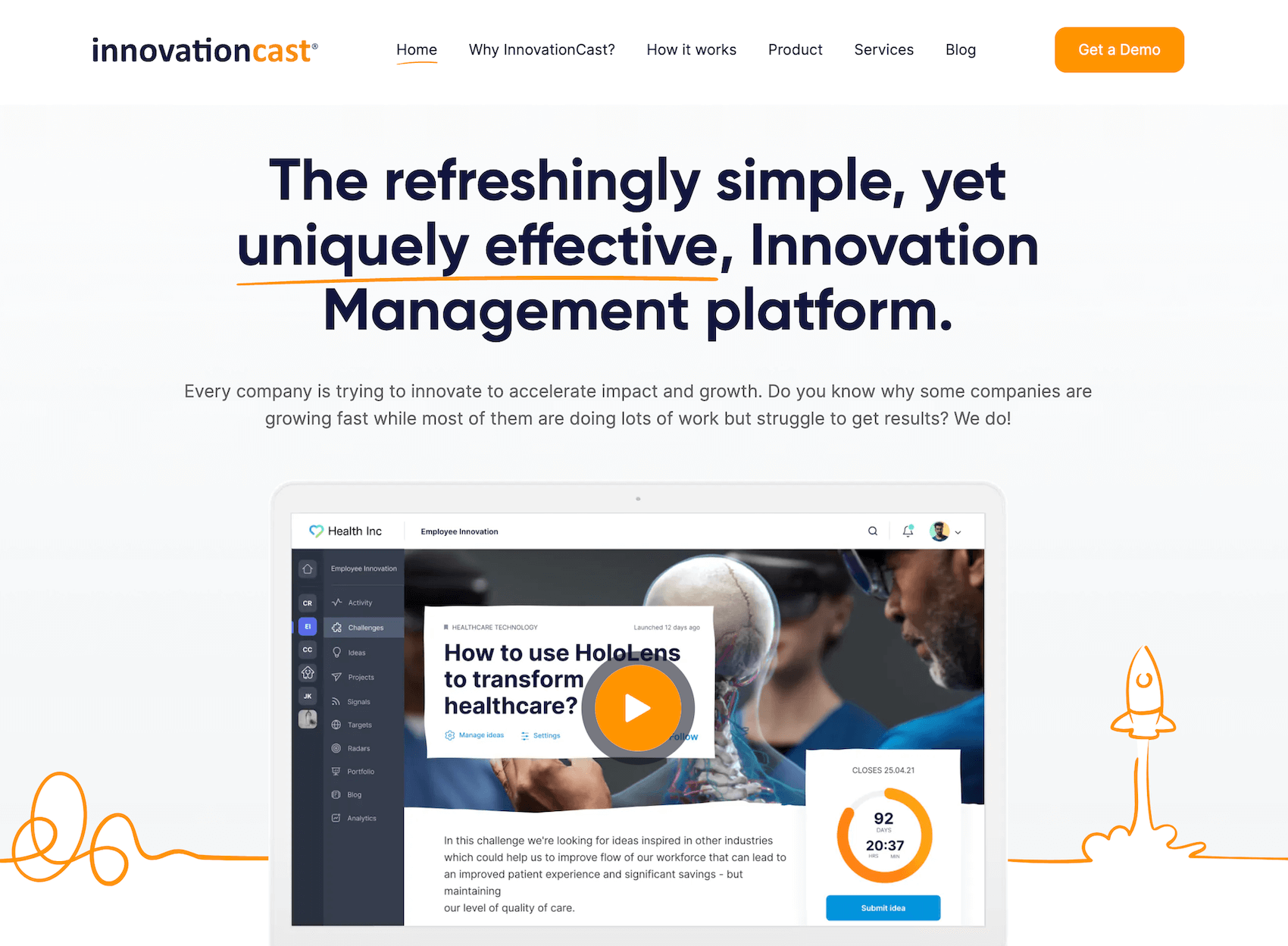
Before founding InnovationCast, we were innovation managers and consultants, and we identified a significant gap in the market: most social innovation software lacks an integrated network of innovators for sourcing ideas, requiring organizations to build their own networks.
Additionally, most innovation software offers minimal guidance on evaluating, validating, and implementing ideas, leaving organizations unsure how to turn concepts into real-world solutions, causing them to remain stagnant.
We built InnovationCast to address these challenges.
Organizations Can Source Ideas That Drive Positive Social Change
InnovationCast Provides Users with Access to Thousands of Social Innovators
Through our partnership with HeroX, organizations tap into a network of thousands of social innovators, including startups, local communities, small businesses, universities, mentors and more — eliminating the need to build their own innovation network.
If organizations already have a network, they can invite them to InnovationCast, where participants can learn about social priorities, share ideas, and collaborate.
When top management logs into InnovationCast, they can access a comprehensive dashboard showcasing all innovation participants. From there, they can source ideas in two ways:
Innovation Challenges: Organizations can educate their innovation network on current social innovation initiatives and invite them to submit relevant ideas.
Category-based “Always On”: Organizations can enable their network to continuously bring new social initiatives to light.
Innovation Challenges
Innovation Challenges are urgent calls for ideas on specific topics. When organizations launch a challenge, InnovationCast notifies the innovation network, encouraging them to explore the information and submit their ideas.
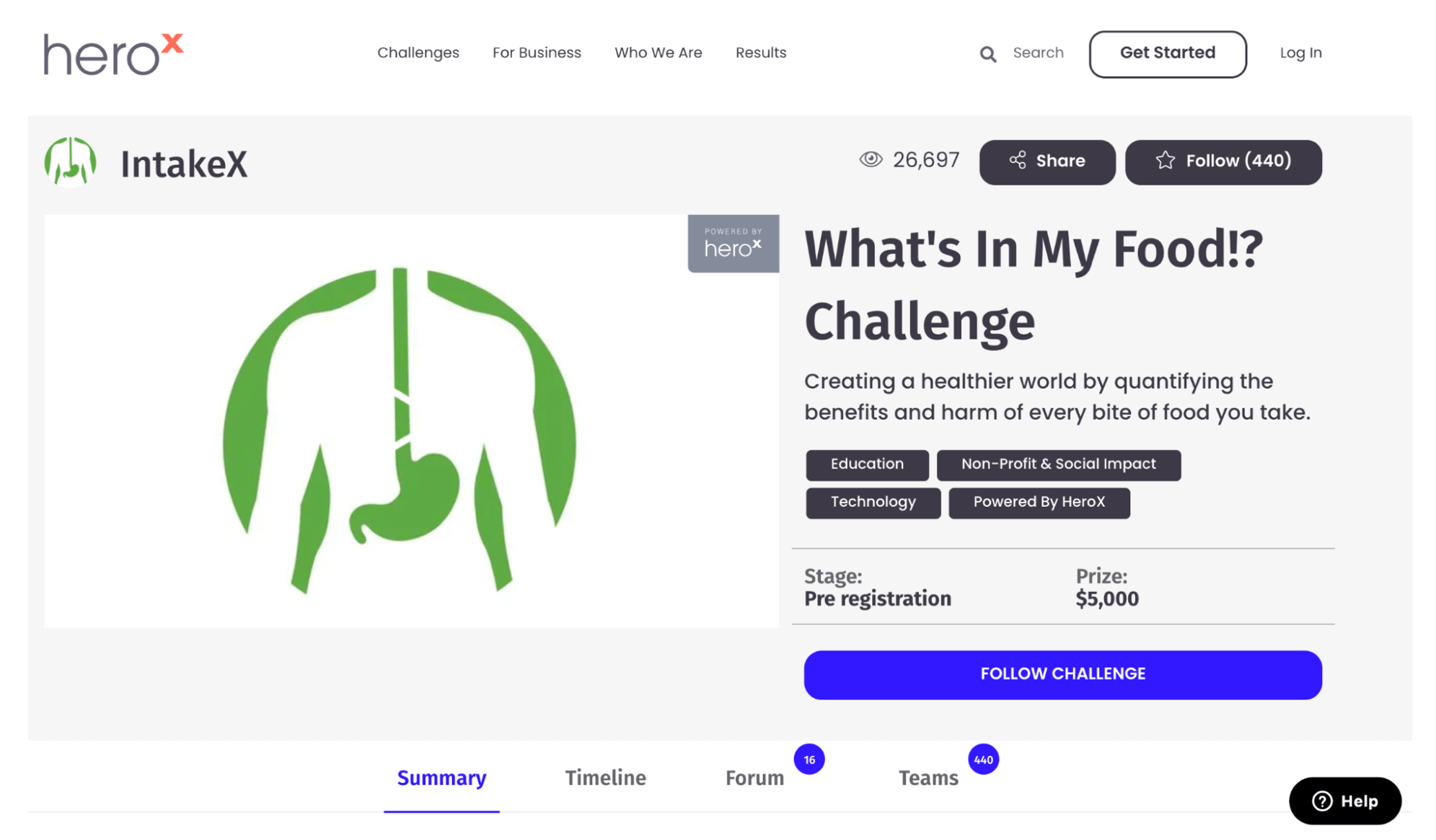
What sets InnovationCast apart from other ideation platforms is its built-in guidance for creating high-quality challenges, including checklists, case studies, and examples. This guidance is grounded in our experience as innovation managers, where we learned what works best from designing thousands of challenges.
In addition to this guidance, we recently added an AI co-pilot to InnovationCast. As users draft their challenges, the AI co-pilot reviews the content and provides feedback based on our recommended best practices, such as focusing on specific points or highlighting gaps in the problem statement.
When users submit their ideas, the AI co-pilot evaluates their input and offers real-time suggestions. Together with the built-in guidance, this empowers organizations to gather higher-quality and comprehensive ideas.
InnovationCast can also identify duplicate ideas and encourage participants to collaborate with the original author, promoting co-creation over duplication. This saves idea evaluators hours of sorting through similar ideas.
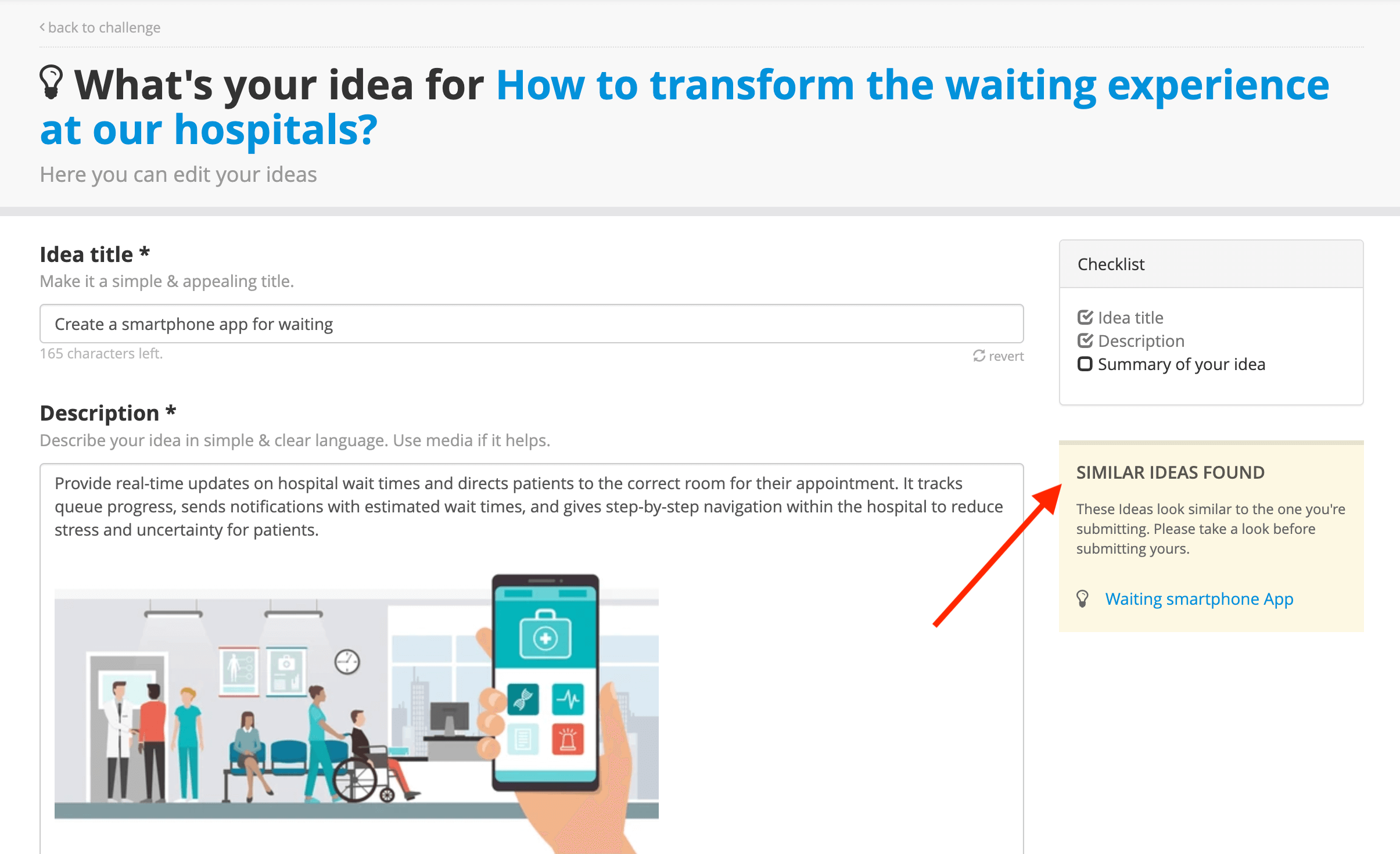
Category-based “Always On”
Category-based “Always On” enables the innovation network and grassroots communities — those directly impacted by the issues being addressed — to submit ideas at any time, even if they aren’t related to an active challenge.
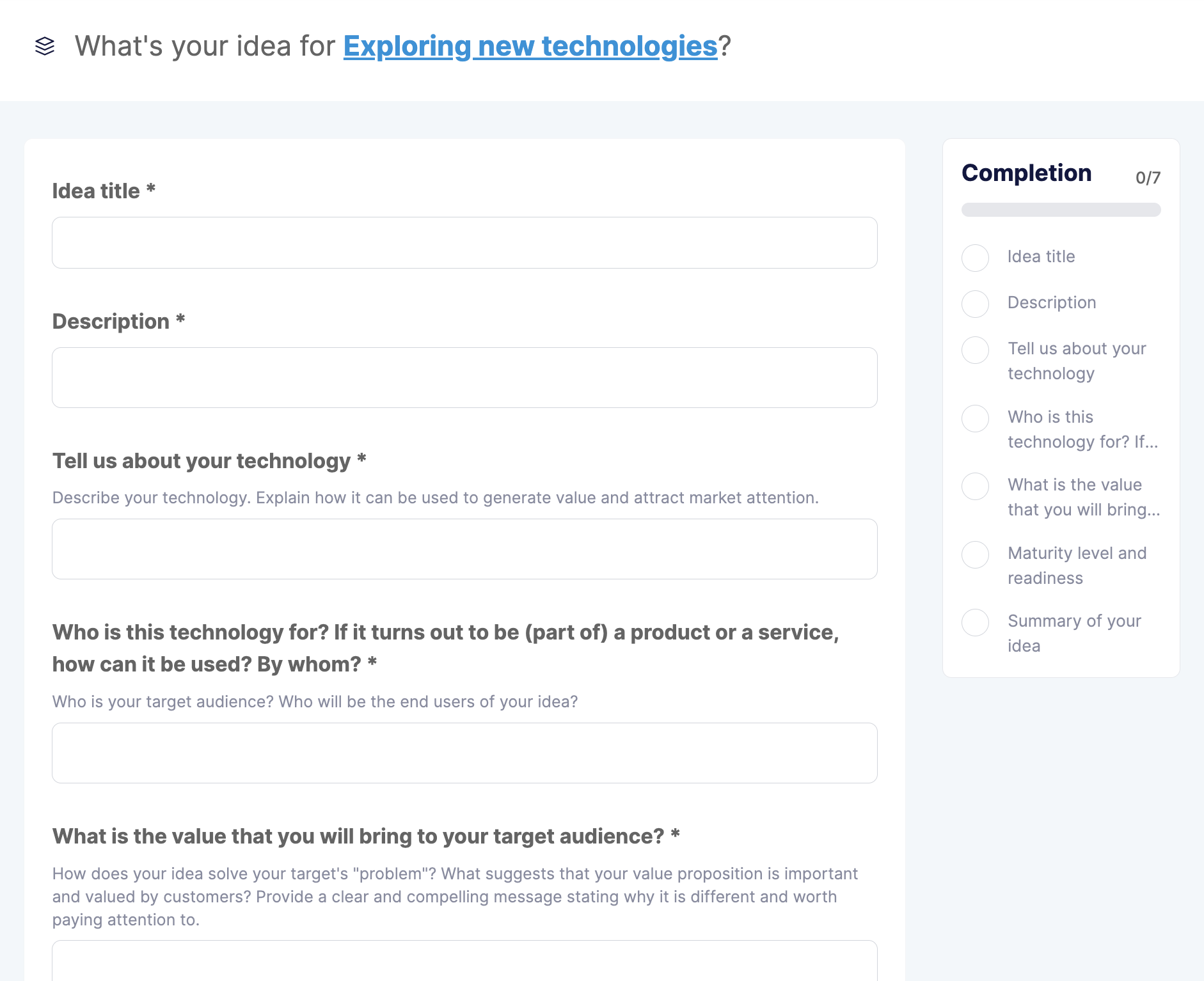
This bottom-up idea collection approach is essential because we've found that distant NGOs and government organizations often lack a full understanding of the problems faced by local communities.
With “Always On,” affected communities can share their lived experiences, challenges, and solutions — insights that organizations may otherwise overlook.
Read more: 5 Best Open Innovation Software Reviews
Organizations Can Improve Ideas Using the Core Competencies of Their Entire Network
All idea submissions are displayed on the InnovationCast news feed, accessible to the entire innovation network upon logging in.
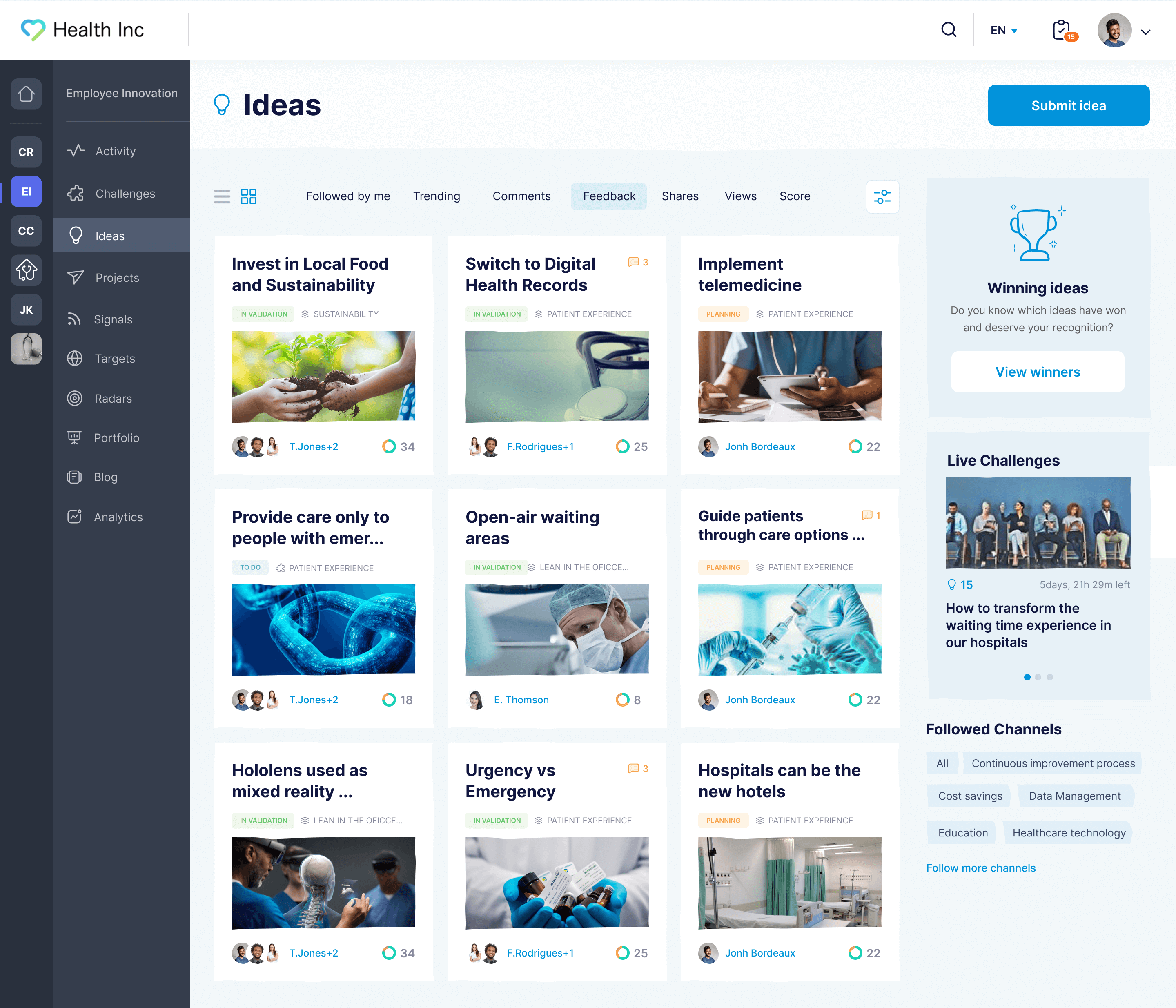
Network users can explore the details of each idea, vote on them, and provide actionable feedback.
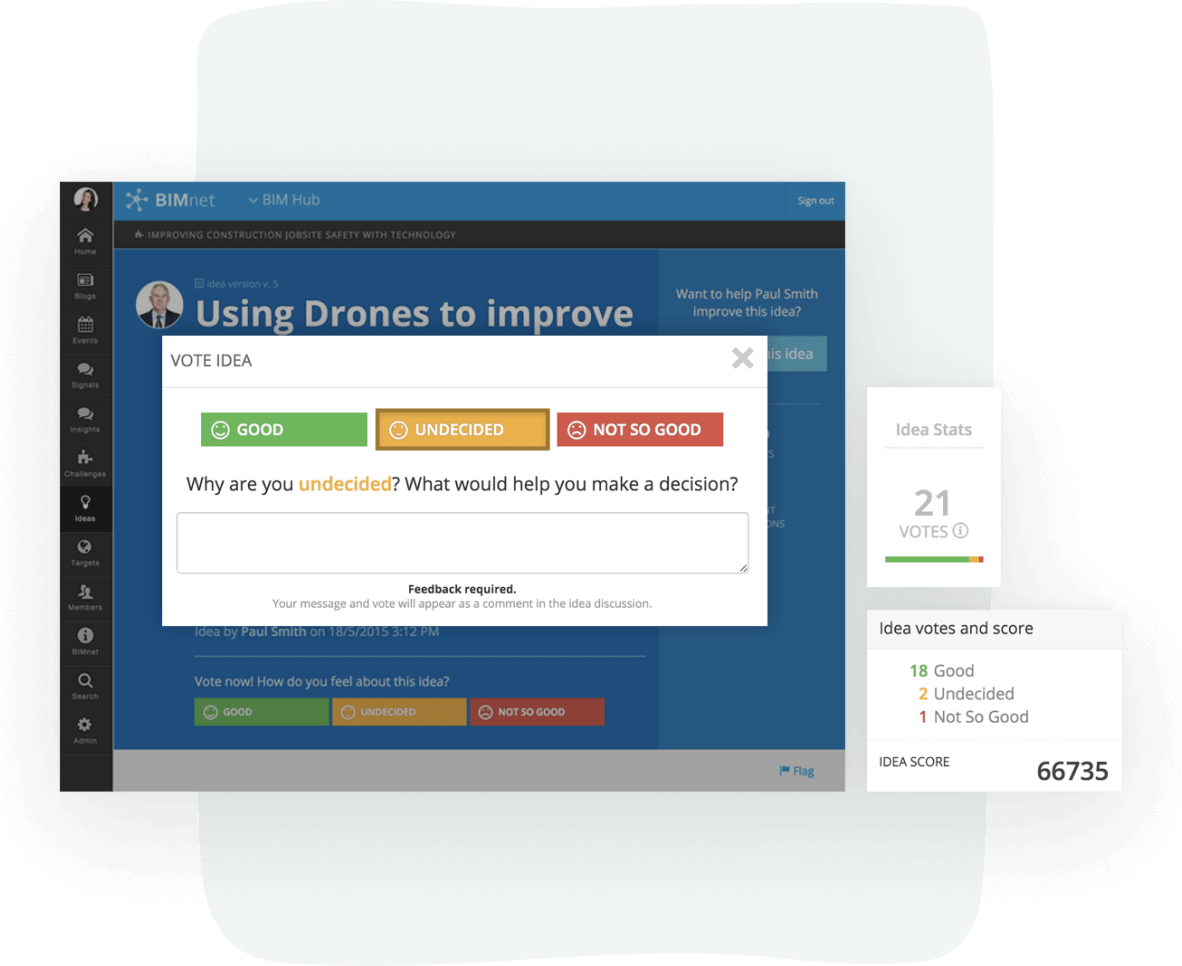
InnovationCast then emails original authors the feedback, enabling them to refine their ideas. By fostering an ecosystem where organizations share knowledge and collaborate toward common goals, they can achieve faster results than when working in isolation.
Additionally, once ideas are improved, organizations can engage outside subject matter experts to evaluate them. This step is essential, as organizations often need expertise beyond their internal workforce. (More on idea evaluation below.)
Read more: Best Practices to Evaluate Innovation Ideas
Organizations Receive Guidance on How to Evaluate & Validate Ideas
One of the biggest challenges organizations face is determining which ideas to approve, reject, and transform into actionable solutions that benefit the community.
To address this, InnovationCast offers workflows that outline the steps, people, and stages involved after ideas are collected. Our workflows help in two key areas:
Idea evaluation: InnovationCast workflows guide organizations on how to identify the best ideas, including recommended scoring systems, relevant subject matter experts to involve, criteria to consider, and data to incorporate.
Idea validation: Once ideas are approved, InnovationCast recommends validating them before implementation. This validation process includes guidance on mapping out assumptions, running experiments to validate those assumptions, and determining key performance indicators (KPIs) to measure success.
As ideas advance through the workflow, InnovationCast notifies the next person or team, ensuring ideas don’t stall.
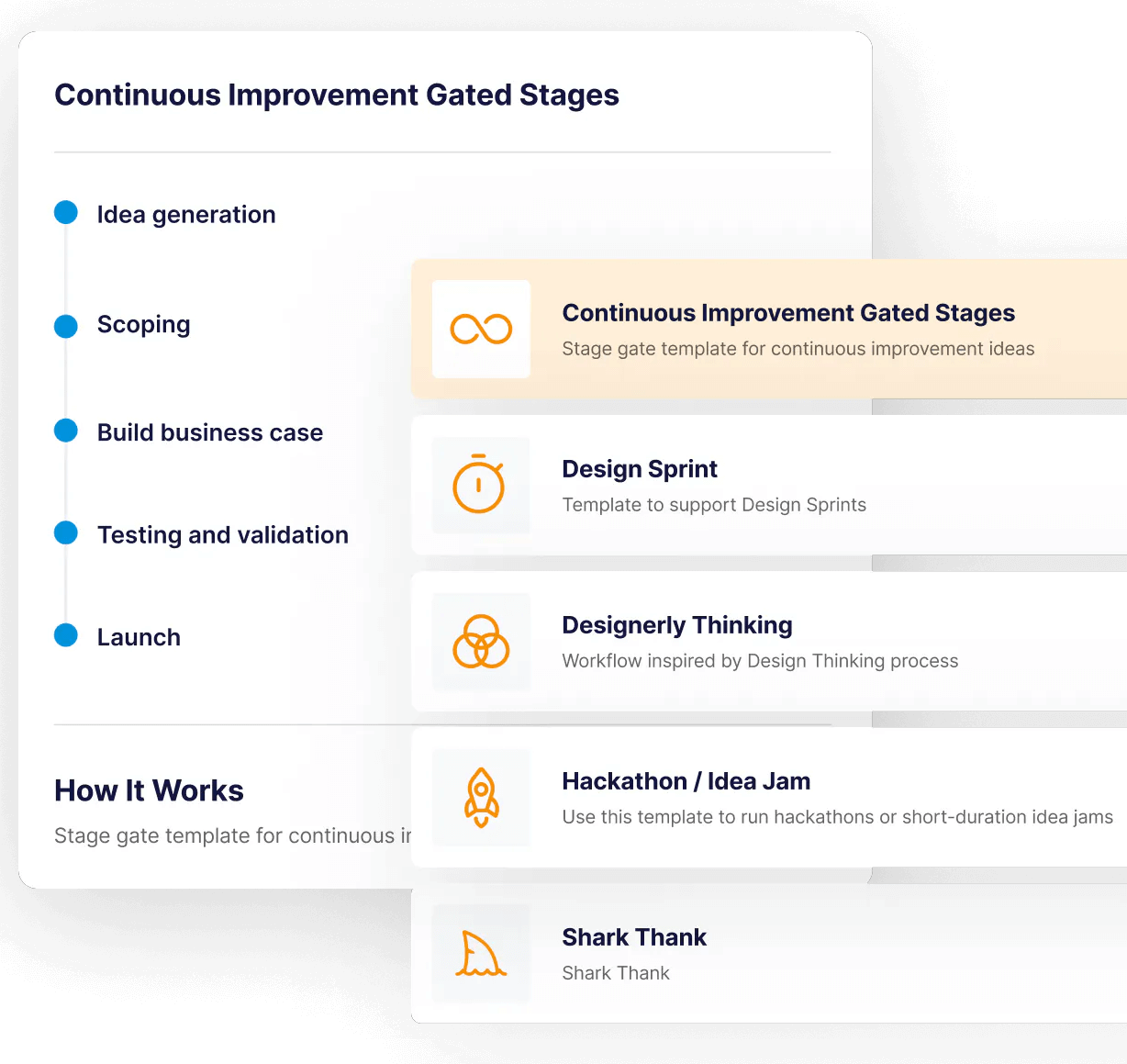
These workflows are built using our extensive experience managing numerous innovation projects. We also incorporate principles discussed in Lean Startup, Design Thinking, Digital Transformation, and Customer Development.
However, what differentiates InnovationCast from other innovation platforms is that we have multiple workflows, all built for different types of social ideas. We have workflows for community-driven initiatives, sustainable development projects, and public health solutions. There’s no need for teams to use a generic workflow for all ideas.
Moreover, teams can customize these workflows to align with their organization’s needs by rearranging, creating, or deleting task cards. They can also design entirely new workflows from scratch.
Read more: Idea Validation: A Guide to Affordably Testing Ideas
Organizations Can Manage Their Social Innovation Portfolio and Measure Impact Effectively
To help organizations track the societal impact of their innovation projects, InnovationCast includes a reporting dashboard that allows users to import data from various data visualization platforms, such as Microsoft BI, Google Charts, and Tableau.
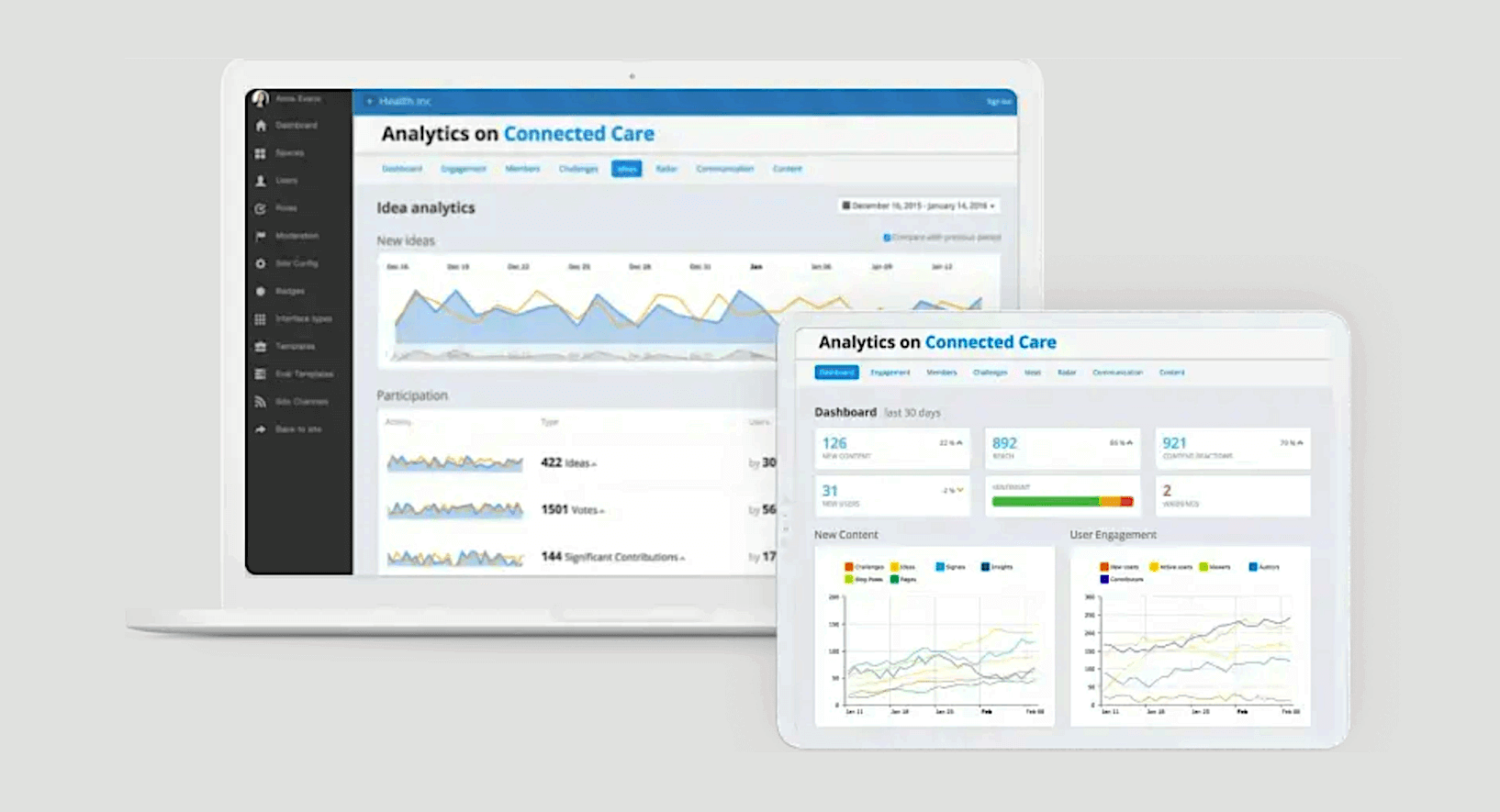
When stakeholders, donors, and public and private sector partners log in, they can see which projects are being funded, how much capital they are receiving, and what value they are generating. Organizations can track outcomes such as:
Social impact (e.g., through SDG metrics)
Lives improved or saved
Access to services such as education or healthcare
Environmental benefits (e.g., reduced emissions, biodiversity gains)
Community engagement levels
And more
This gives top management a clear picture of all the innovation projects the organization is pursuing. They can see which innovations are driving the most value and which aren’t working. Then, they can redirect time and resources toward innovations that create greater value.
Additionally, this reporting dashboard improves transparency and builds trust amongst nonprofits, their donors, and public sector partners because everyone can see what money is being spent on and the results of their social investments.
Read more: How to Measure Innovation: Essential KPIs & Best Practices
Features That Help Organizations Engage a Broader Pool of Perspectives
Signals & Scouting
Signals & Scouting is a trend-tracking feature within InnovationCast that helps organizations and their innovation network stay updated on societal challenges, emerging trends, and grassroots insights.
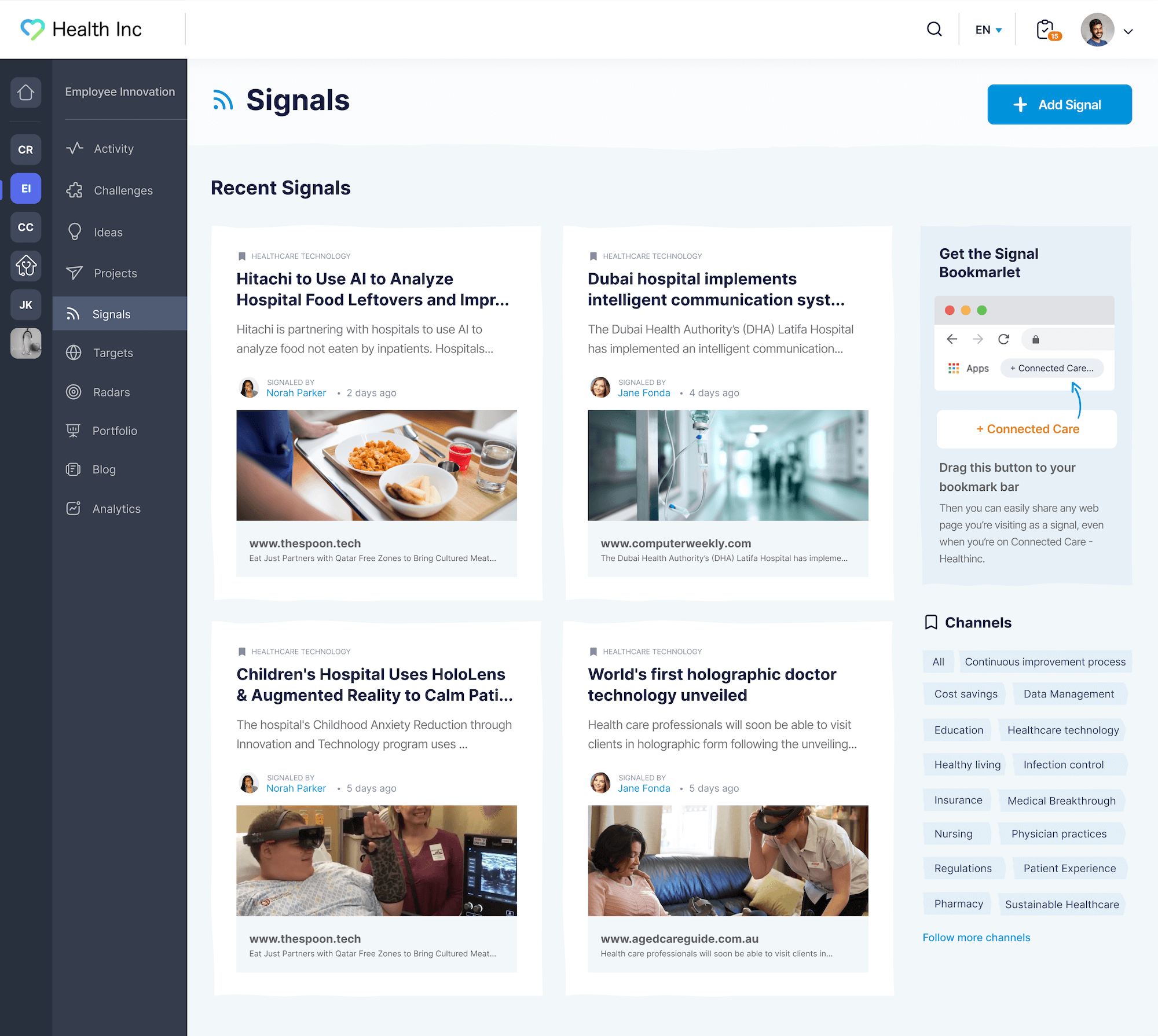
Signals & Scouting encourages users to share news they encounter in their daily lives with the entire innovation network. This could include researchers sharing recent studies, policymakers posting policy updates, or grassroots stakeholders sharing personal stories or community insights.
Other members of the innovation network can assess these insights, start discussions, and explore ideas to address them.
Within most organizations, these types of discussions are typically siloed inside Slack channels and email threads that not everyone has access to. By centralizing these conversations and leveraging collective brainpower, organizations can address issues more quickly and develop more effective solutions.
Badges & Rewards
Organizations can reward innovation participants in two ways:
Offer rewards for performing certain actions. This could be when they submit an idea, participate in a validation project, or lend their time to evaluate ideas.
Implement a points system that allows users to cash out when they receive a certain number of points. This way, users can save up points and spend them on their favorite rewards.
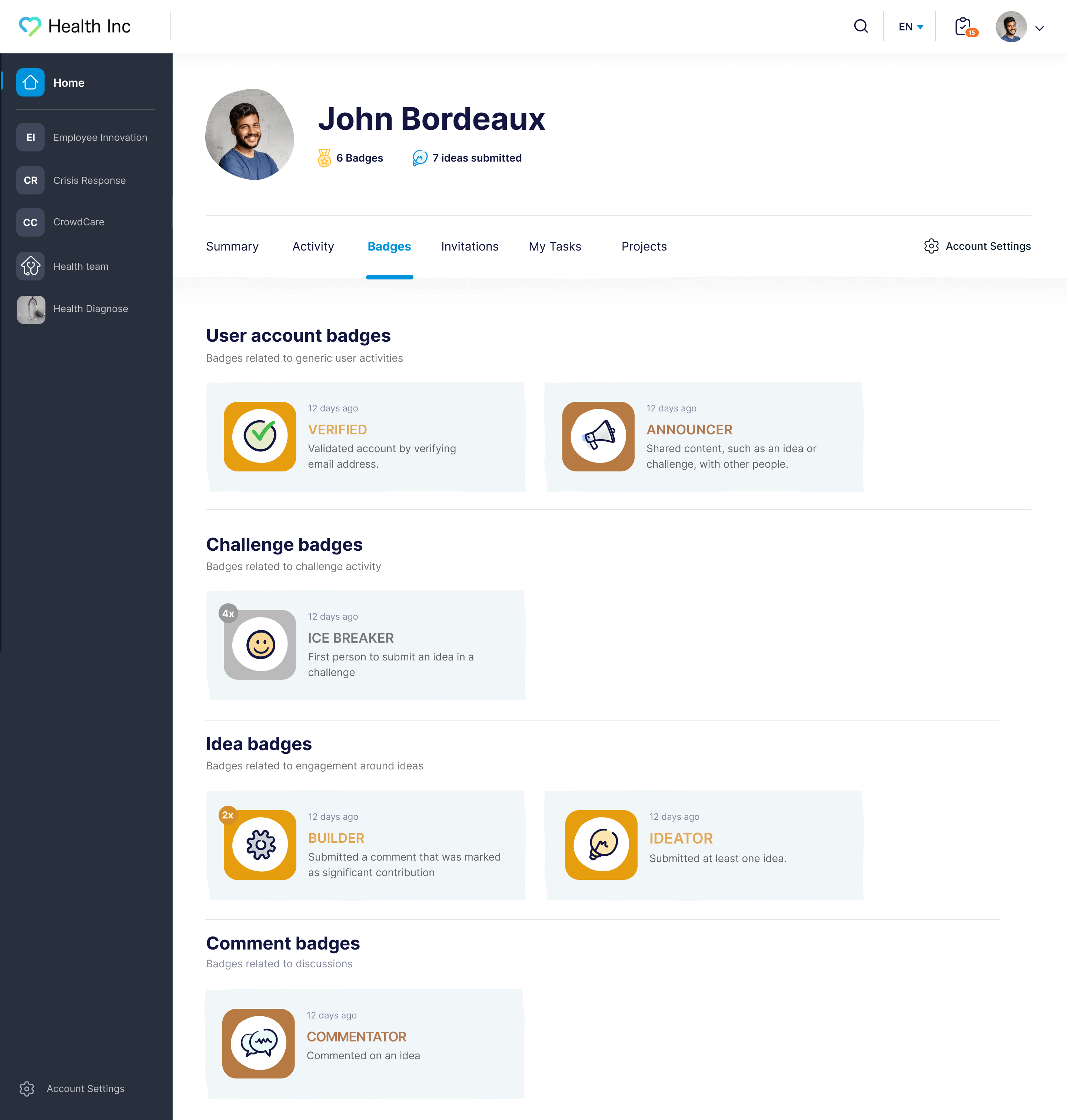
Educational Materials
Many innovation participants, particularly grassroots members and communities, often feel their ideas are insignificant and that organizations only value revolutionary concepts, like curing cancer or solving world hunger and climate change. This belief discourages them from sharing ideas.
What they may not realize is that their lived experiences and insights into community problems offer valuable perspectives. These seemingly smaller ideas often form the foundation of social innovation.
With that in mind, we added educational materials (guides, short emails, video clips, case studies, etc.) to InnovationCast, helping organizations get users involved.
These materials have helped many InnovationCast clients build innovation programs with high participation rates in under four weeks.
What InnovationCast Customers Say
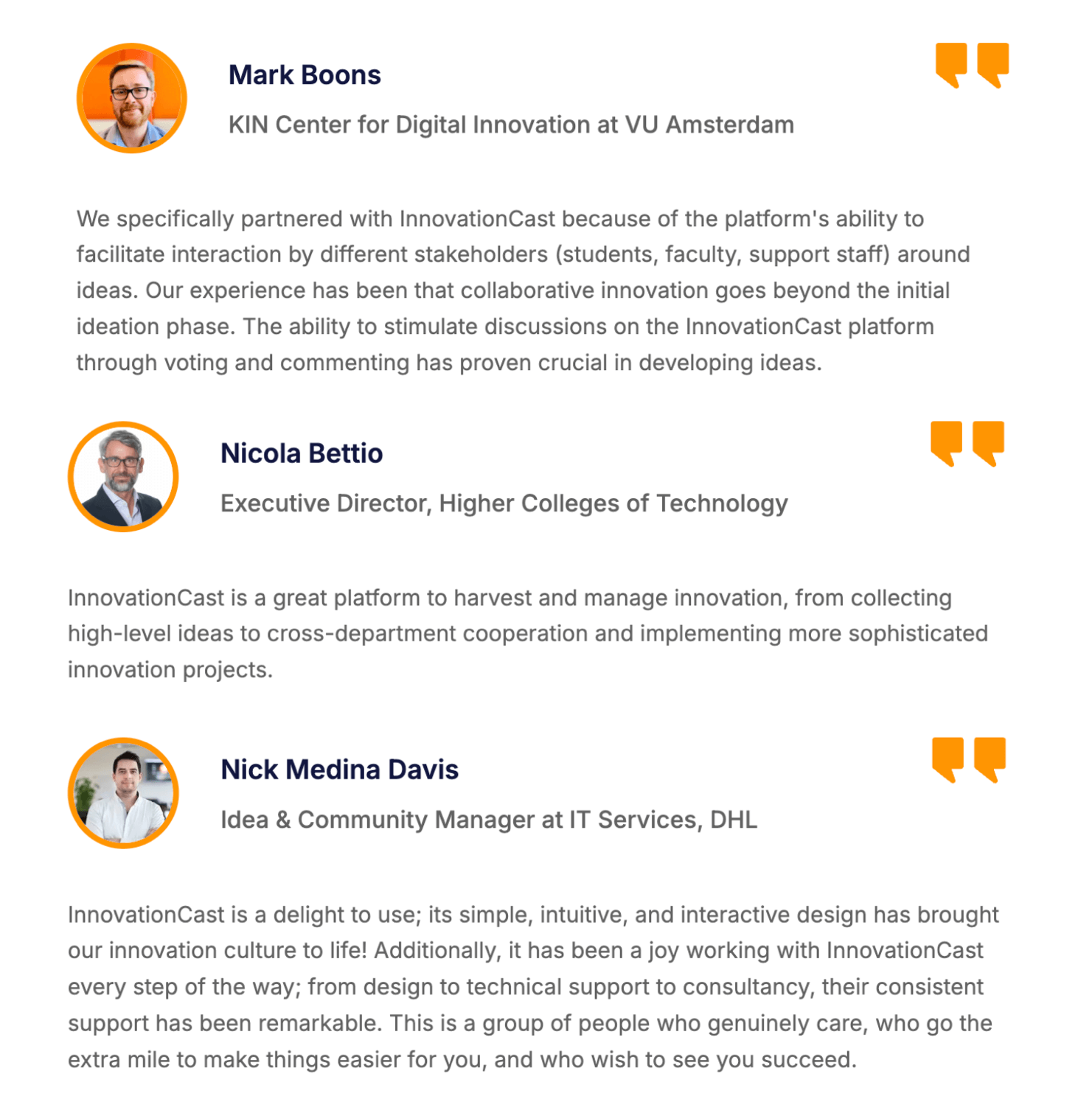
Get Started
To see how InnovationCast can help you develop innovative solutions for social problems, book a free demo with our team.
2. Skipso
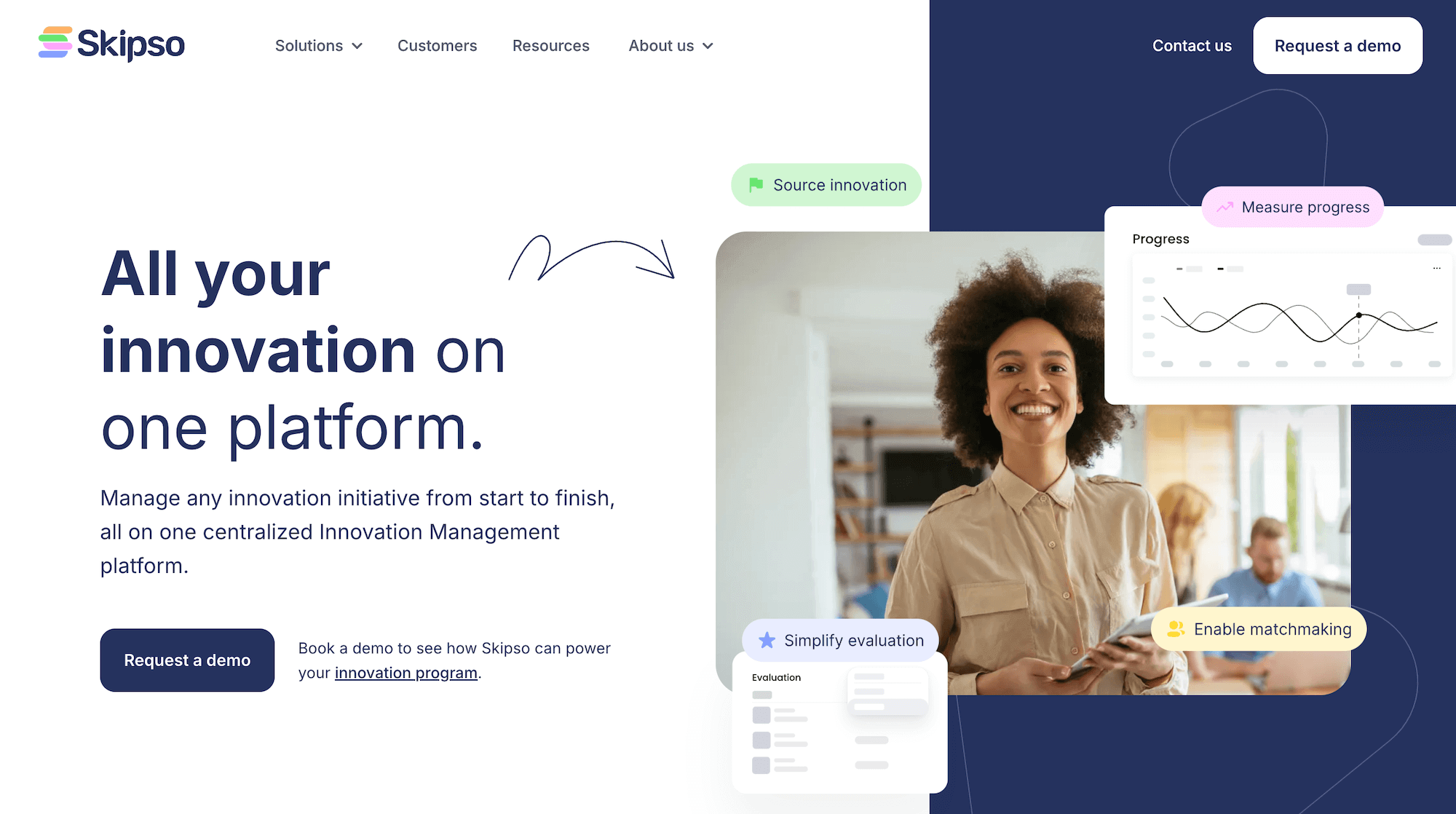
Skipso is an innovation management platform designed to help companies implement effective innovation programs. NGOs and other mission-driven organizations have used Skipso to foster collaboration, manage ideas, and drive impactful solutions for societal challenges.
The digital platform supports the entire lifecycle of social innovation, from idea generation to implementation and outcome tracking.
Features
Idea management: Collect, evaluate, and develop ideas focused on addressing social and environmental issues.
Collaboration: Connect with communities, nonprofits, and stakeholders to co-create sustainable solutions.
Grant and funding management: Manage social innovation projects, including tracking funding opportunities and grant applications.
Social impact tracking: Measure the real-world impact of innovations in areas like education, health, and sustainability.
Knowledge sharing: Enable participants to share insights, best practices, and case studies to strengthen collective learning.
3. HYPE Innovation
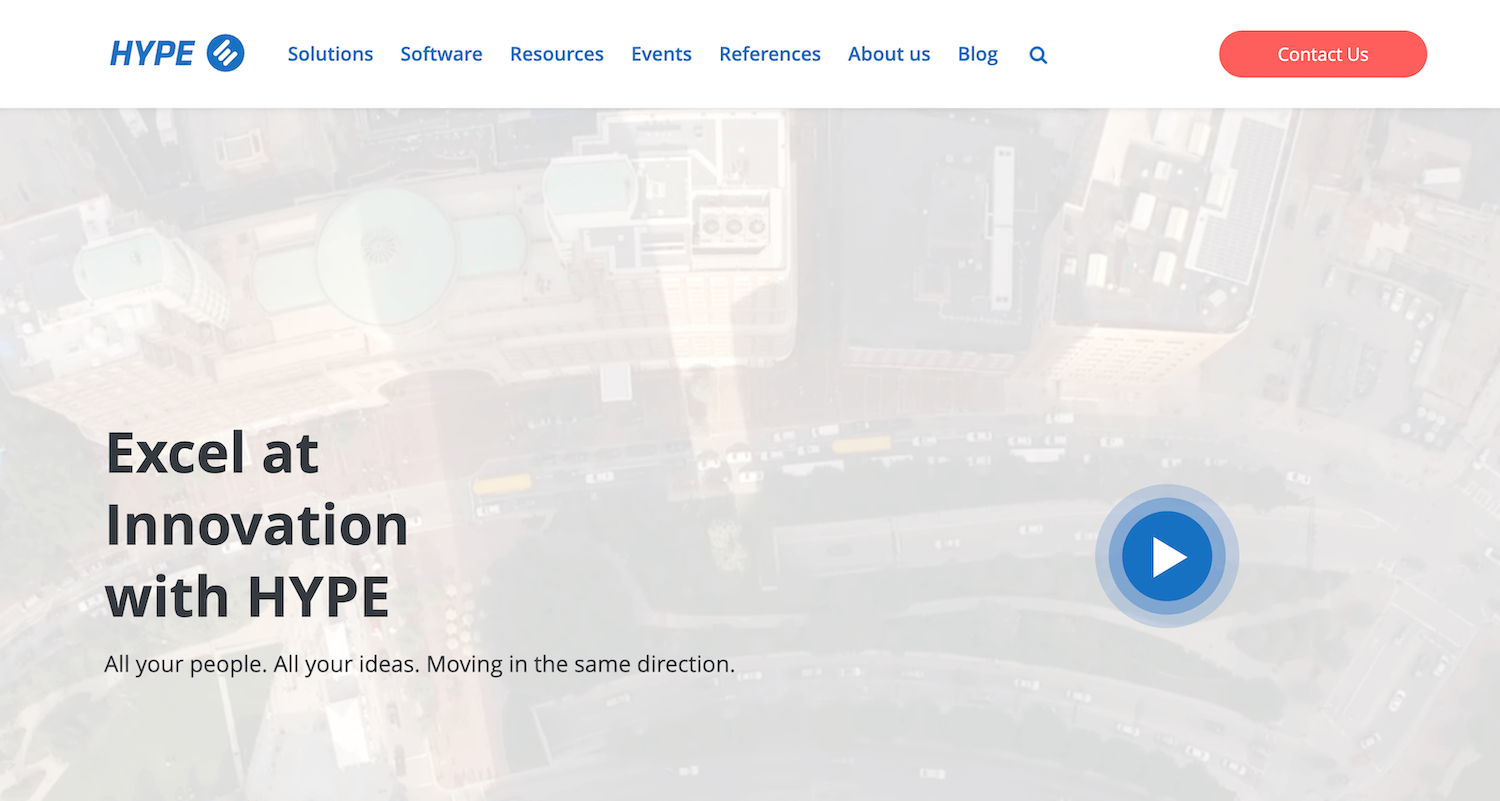
HYPE Innovation is an innovation and idea management platform offering comprehensive software to support various types of innovation initiatives, including social innovation. Organizations can generate transformative ideas, evaluate them, and turn them into shippable innovations.
HYPE’s platform includes tools for collaboration, partner engagement, and project oversight, complementing its core innovation management features.
Features
Strategic alignment: HYPE’s consultants work with organizations to identify social challenges and develop an innovation strategy.
Idea generation and management: The platform offers tools like challenges, hackathons, and shark tanks for generating creative ideas.
External collaboration: Facilitate partnerships with NGOs, funders, healthcare providers, and local communities to identify opportunities for collaboration and investment.
Project management: Use built-in workflows to guide validation, decision-making, and the implementation of initiatives.
Impact measurement: Track the outcomes of implemented solutions to measure social impact.
4. Wazoku
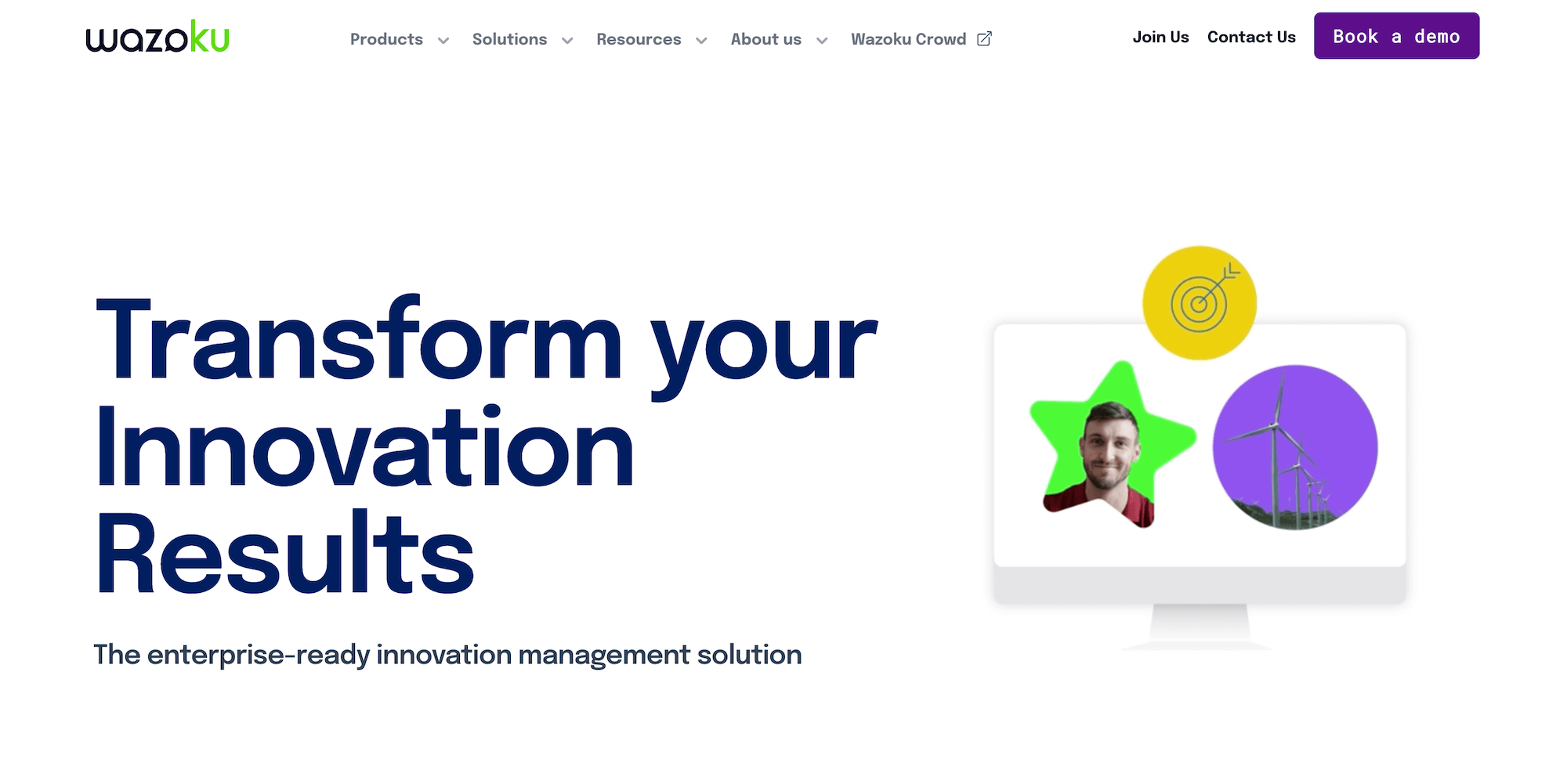
Wazoku is a cloud-based idea management platform designed to help companies establish an innovation culture. NGOs and government agencies have also used Wazoku to achieve their innovation goals.
The digital platform enables organizations to crowdsource ideas, refine and assess them, and turn them into impactful solutions. During onboarding, Wazoku’s team collaborates with users to align the platform with their social innovation goals.
Features
Social innovation ecosystem: Tools to gather ideas from employees, communities, and stakeholders, incentivize participation with rewards, and provide training to build an innovation-first culture.
Collaborative co-creation: Facilitate collaboration between internal teams and external partners (e.g., nonprofit organizations, policymakers, social entrepreneurs, and service providers) to refine ideas.
Open innovation: Access external talent and expertise to solve pressing social problems.
Technology discovery: Identify technologies and build partnerships with startups and social entrepreneurs focused on social impact.
Innovation networks: Join Wazoku’s global hub to collaborate with innovation teams and share best practices.
5. Qmarkets
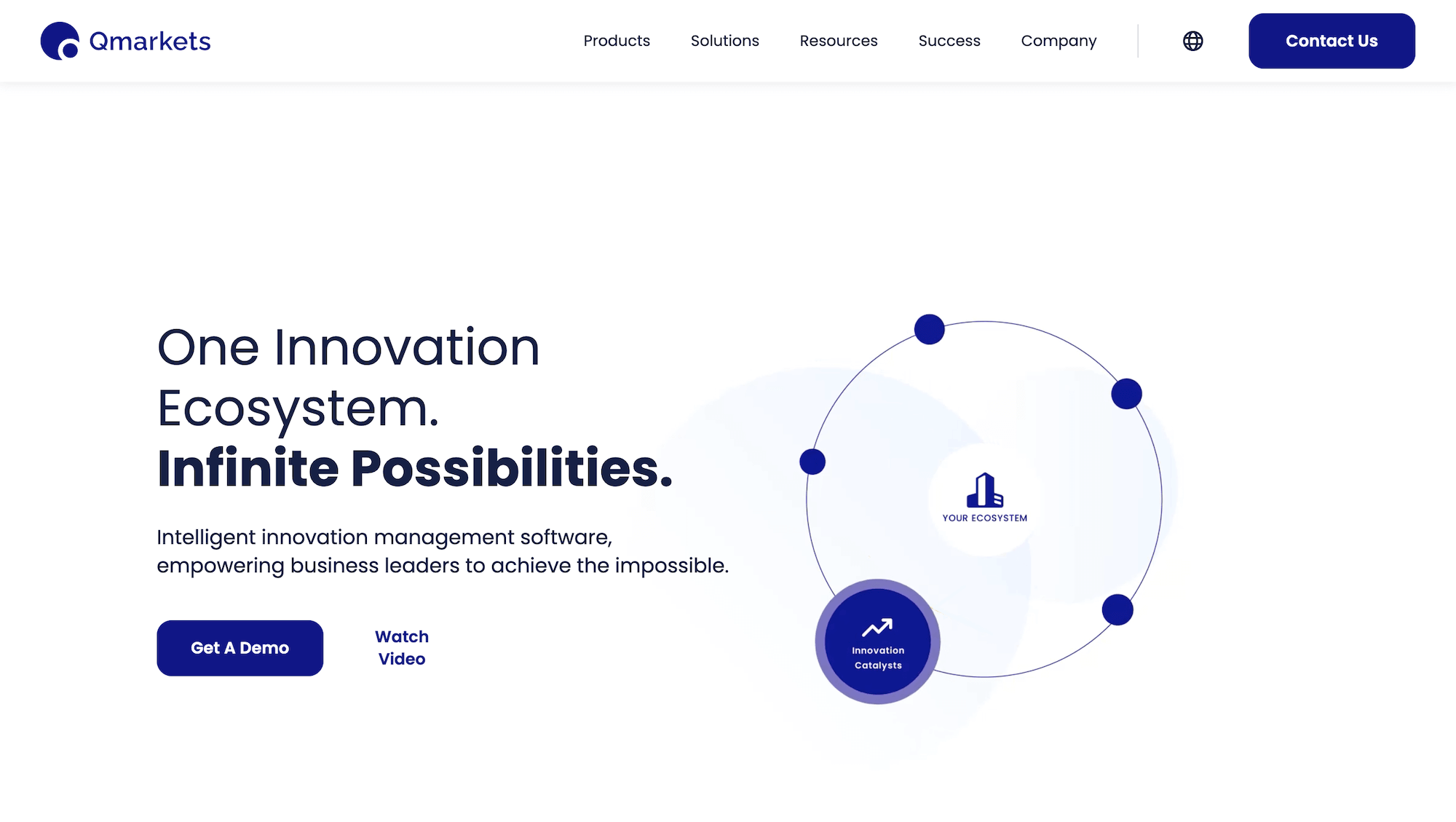
Qmarkets is social enterprise innovation management software tailored to help large organizations implement social innovation. It empowers teams to source ideas from employees, communities, and external partners and transform them into solutions for societal challenges.
Qmarkets offers features like challenge-based ideation and collaborative digital brainstorming to align innovation efforts with social issues. During onboarding, their customer success team guides users through the entire process — from gathering and evaluating ideas to implementing them and tracking their social impact.
Features
Q-ideate: A crowdsourcing tool where social innovation leaders can create focused challenges to address key societal issues, encouraging participation from employees and external stakeholders.
Q-optimize: A continuous improvement feature enabling users to propose enhancements to existing solutions that advance social impact goals.
Q-trend: A trend-monitoring tool that helps identify emerging social, environmental, and industry trends. Users can prioritize trends and design strategies to address pressing needs.
Q-scout: Facilitates open innovation by inviting input from students, startups, nonprofits, and researchers to co-create solutions for complex social challenges.
Q-impact: Provides an overview of ongoing and past social entrepreneurship initiatives, enabling organizations to measure and report their social outcomes.
Drive Positive Change with InnovationCast
Schedule a quick demo with our team to learn how InnovationCast supports social innovation.
Related reads:

